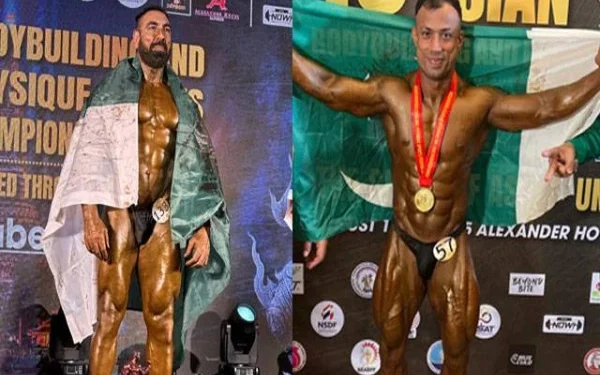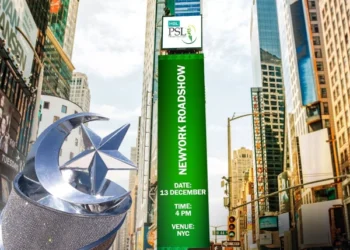Introduction
The 57th Asian Bodybuilding and Physique Sports Championship, held recently in Thailand, proved to be a historic event for Pakistan. National athletes showcased extraordinary talent, discipline, and determination, ultimately returning home with five gold medals. Their victory was not only a sporting triumph but also a moment of pride for the entire nation.
As the team landed at Karachi’s Jinnah International Airport, the atmosphere was filled with chants of “Pakistan Zindabad”. Families, fans, and members of the Pakistan Bodybuilding Federation (PBBF) gathered to honor the champions who elevated the country’s name on the global stage.
Pakistan’s Glorious Performance in Thailand
Pakistani athletes demonstrated their strength, skill, and perseverance in the championship, competing against some of the best bodybuilders from across Asia. The event, which saw participation from dozens of countries, highlighted fierce competition in various weight and physique categories.
Medal Winners
Pakistan secured a total of five gold medals, an achievement that places the nation firmly on the map of international bodybuilding. The winners included:
- Muhammad Shakeel – Gold Medalist in his category.
- Farasat Ali – Gold Medalist.
- Ijaz Ahmed – Gold Medalist.
- Faizan Gul – Gold Medalist.
- Bilal Ahmed – Gold Medalist.
Each of these athletes represented not just themselves but the hopes and aspirations of millions of Pakistanis who long for global recognition in sports beyond cricket and hockey.
Warm Welcome at Karachi Airport
When the bodybuilders returned home, Karachi Airport turned into a scene of celebration. With national flags waving high, enthusiastic supporters showered the athletes with love and admiration.
The heroes were greeted with bouquets, garlands, and slogans of “Pakistan Zindabad”, a sight that truly symbolized the unity and pride of the nation. The reception was led by Pakistan Bodybuilding Federation President and former Deputy Governor Karachi, Tariq Hassan, who personally welcomed the champions.
The emotional homecoming reflected how deeply Pakistanis value sporting excellence, especially when achieved on an international platform.
Statement from Pakistan Bodybuilding Federation President Tariq Hassan
While addressing the media, Tariq Hassan highlighted the significance of this victory. He stated:
“Our bodybuilders have made Pakistan proud on the global stage. They have proven that with hard work and dedication, our athletes can compete and win against the best in the world. It is now the government’s responsibility to support and patronize these talented sportsmen.”
His remarks echoed the sentiments of many within the sports community, who believe that bodybuilding in Pakistan remains underfunded and underrecognized despite consistent international achievements.
The Growing Popularity of Bodybuilding in Pakistan
Bodybuilding has gained immense popularity in Pakistan over the past two decades. Once considered a niche pursuit, it has now developed into a mainstream sport and lifestyle, attracting youth from urban and rural areas alike.
Factors Behind Growth
- Increased Awareness of Fitness – The rise of gyms and fitness centers across major cities has encouraged young people to pursue bodybuilding.
- International Exposure – Pakistani athletes competing abroad have inspired a new generation of bodybuilders.
- Social Media Influence – Platforms like Instagram, TikTok, and YouTube showcase bodybuilding culture, motivating more participation.
- Role Models – Athletes like Salman Ahmed, Shahid Jutt, and now the recent gold medalists have become role models for aspiring bodybuilders.
Challenges Faced by Pakistani Bodybuilders
Despite their remarkable achievements, Pakistani bodybuilders face significant challenges that hinder their progress on the global stage.
1. Lack of Financial Support
Most athletes rely on personal savings or community sponsorships to cover travel expenses, supplements, and training costs. Without adequate financial backing, competing internationally becomes a struggle.
2. Limited Government Patronage
Unlike cricket or hockey, bodybuilding does not receive structured government support. This lack of institutional backing forces athletes to prepare with limited resources.
3. Shortage of Facilities
While gyms are growing, specialized training facilities, nutrition programs, and expert coaching are still scarce in Pakistan.
4. Recognition Issues
Bodybuilders often complain that their achievements receive little to no media coverage compared to other sports. This hampers sponsorship opportunities and public awareness.
International Recognition of Pakistani Bodybuilders
The success in Thailand is not the first time Pakistani athletes have excelled internationally. Over the years, Pakistan has produced several world-class bodybuilders who brought home medals from Asian and world championships.
Names like Atif Anwar, Salman Ahmed, and Masoom Butt are already recognized globally for their achievements. The recent gold medal haul further strengthens Pakistan’s reputation as a rising force in bodybuilding.
The Role of the Pakistan Bodybuilding Federation (PBBF)
The Pakistan Bodybuilding Federation plays a pivotal role in organizing domestic competitions, selecting talent, and preparing athletes for international events. Under the leadership of Tariq Hassan, the federation has:
- Facilitated participation of Pakistani athletes in Asian and world championships.
- Conducted national competitions to identify emerging talent.
- Advocated for government and corporate sponsorships.
- Worked on athlete development programs, though with limited funding.
Despite financial constraints, the PBBF’s efforts have kept Pakistan’s bodybuilding community active and competitive.
Calls for Government Support
Following the gold medal victories, sports experts and fans alike are calling on the government to increase investment in bodybuilding and fitness sports.
- Scholarships and grants for athletes.
- Establishment of international-standard training centers.
- Regular funding for participation in global events.
- Promotion of bodybuilding through media and awareness campaigns.
Such measures would not only help athletes perform better but also encourage youth participation, which could reduce issues like drug addiction and unhealthy lifestyles.
Impact on Pakistan’s Youth and Sports Culture
The triumph of Pakistani bodybuilders at the Asian Championship is more than just a medal count. It has:
- Inspired youth to pursue sports and fitness as a career.
- Created a sense of national pride and unity.
- Highlighted the importance of discipline, hard work, and perseverance.
- Enhanced Pakistan’s global sporting reputation beyond cricket and hockey.
In a country where sports opportunities are limited, such victories act as beacons of hope for young athletes.
Future of Bodybuilding in Pakistan
Looking ahead, the path for bodybuilding in Pakistan is full of opportunities if systematic steps are taken. With government patronage, private sponsorships, and media promotion, Pakistan can emerge as one of the leading nations in bodybuilding.
Experts believe that if the energy and determination of athletes like Muhammad Shakeel, Farasat Ali, Ijaz Ahmed, Faizan Gul, and Bilal Ahmed are harnessed properly, Pakistan can produce world champions consistently in the coming years.
Conclusion
The return of Pakistan’s bodybuilding champions from Thailand with five gold medals is not just a sporting achievement—it is a reminder of the untapped potential within the nation’s youth. The warm welcome at Karachi Airport reflected the nation’s admiration and pride for its heroes.
As Tariq Hassan rightly pointed out, the onus now lies on the government and policymakers to support, finance, and promote bodybuilding in Pakistan. With proper backing, the sport can flourish, and athletes can continue to raise Pakistan’s flag high in international arenas.
The 57th Asian Bodybuilding Championship has proven once again that Pakistan’s athletes are second to none when given the opportunity. Now is the time to transform these victories into sustainable growth for bodybuilding and sports culture across the nation.

























